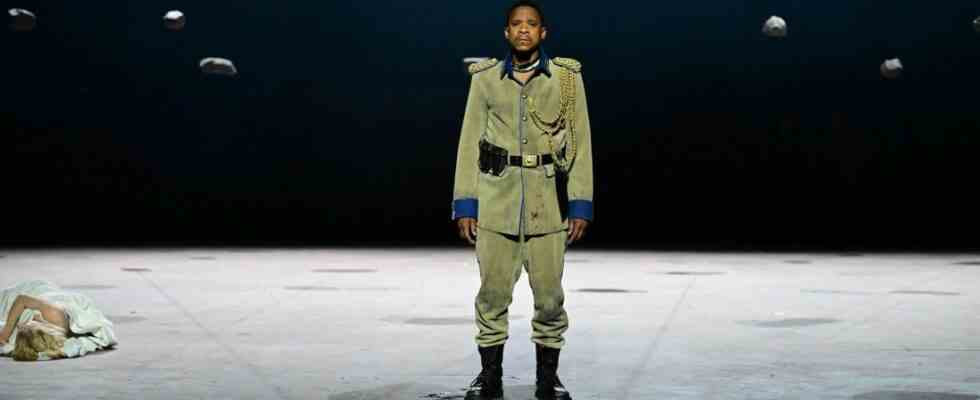Black O on yellow background, O for Othello: The poster is visible all over the city, the Dusseldorf theater, D’haus for short, starts the PR machine, and yes, it works, the house is full, the mood is full of expectations. The white South African Lara Foot stages William Shakespeare’s Jealousy Tragedy with a fellow black man in the title role, the rest of the ensemble is made up of Düsseldorfers, so the performance is multilingual and has surtitles; that gives it a cosmopolitan flair. And Foot reads the play differently than you know it: it is not set in Venice and Cyprus, but in South West Africa, the former German colony that is now called Namibia.
Three years ago there was a scandal at D’haus, a white director is said to have racially insulted a black actor. Since only good people work at the D’haus like at all other theaters, the dismay was great. On closer inspection, the elusive melange of nonchalance, vulnerability and tense vigilance reveals a motif that, coincidentally or not, is also at the heart of the Shakespearean play: resentment. The offended ensign Jago, who was passed over for promotion, instigates a dreadful intrigue in order to ruin his general Othello, his wife Desdemona and a few others. Resentment as the root of evil is Shakespeare’s timeless theme, and he circles it with frightening force.
In this reading, Jago is not an evil clown, not a joker – no, he is simply a quick-witted rascal
The director tries to shift focus: not just from one setting to another, but also from Jago to Othello. Foot’s invention: The African general is supposed to help the European colonizers throw the natives back to their “jungle status”. This is tricky, but the mercenary at least seems to be doing the job without personal cruelty. Bongile Mantsai is an impressive, glamorous actor, and Foot invents additional scenes for him, such as prayer or meditative playing on an instrument, which show the military (and Christians) in a kind of glamorous isolation, almost intimacy. In addition, Mantsai not only speaks English, but also, at emotional points, his melodic mother tongue Xhosa.
Jago, on the other hand, played by Wolfgang Michalek, is not an evil clown in this reading, not a joker, he is not Othello’s psychoanalyst either (as someone clever pointed out) – no, he is simply a quick-witted scoundrel. In addition, in a radical correction of the original, he is saddled with all the murders at the end: Othello, mad with jealousy, does not slaughter the beautiful Desdemona (Pauline Kästner), but Jago does it in his place; he also kills his wife Emilia, who exposes his intrigues and turns against him. And unlike in the original, the remorseful Othello remains alive.
Already the choir, dressed in funny robes, steps in front of the pink curtain, lights a fuse that glows for two hours
This (reverse) black and white contrast is problematic. Because the honorable attempt to decontaminate the text by placing it in the service of an anti-racist narrative also plays it down. At best, Othello can be blamed for his naivety and credulity; in Shakespeare it has abysses. Together with the very naturalistic gesture of the staging, especially in the group scenes, which local theatergoers have not been used to for a long time, the result is a work whose essence one is happy to agree with, but which also does not hurt anyone and whose soft-focus horror one can relate to can evade a pleasant shudder.
That 2019 incident is not “done,” it’s written in the annals of D’house. But in the seventh year of Wilfried Schulz’s directorship, there has been an unmistakable number of good gestures. Bongile Mantsai does not commute between Cape Town and Düsseldorf, but receives an artist residency for a year, so it will probably celebrate another premiere. Robert Wilson’s “Dorian” based on Oscar Wilde is a mega success, the Bürgerbühne, now “Stadtkollektiv” and the Young Theater are flourishing.
Oedipus (Florian Claudius Steffens) does not have an easy life as a patricide and husband of his mother.
(Photo: Thomas Rabsch/D`haus)
And finally, the second opening premiere in the Little House, “Oedipus” after Sophocles, proves to be a real gem. With an inspiring collective of seven players, Felix Krakau, a young director trained at D’haus, takes the liberty of telling the well-known story of Oedipus and his misdeeds in a completely new way: not in an artificial texture striving for originality, as the theater publishers do love, but by means of a clear, direct, humorous address to the audience, which immediately animates and draws them irresistibly into the events. Already the three-person choir, in funny, pseudo-antique robes (Jenny Theisen), stepping in front of the pink lacquer curtain, ignites a fuse with charming embarrassment, which glows for two hours. The fact that a good mood can be combined with the devastating truths of a tragic story without ever becoming silly and superficial is one of the many surprising insights of this successful evening.

